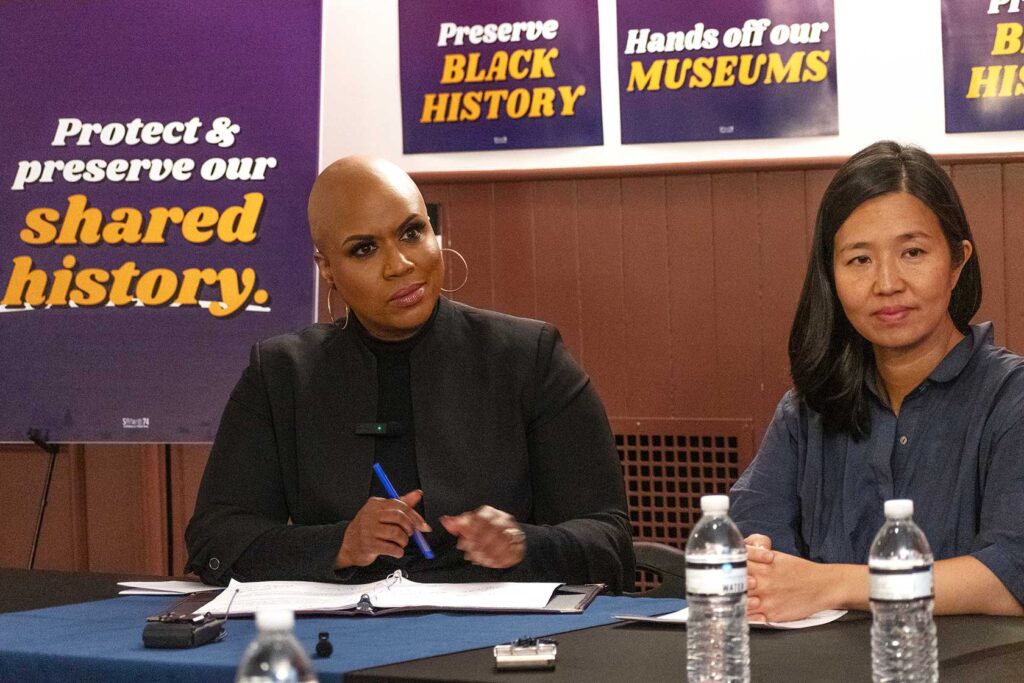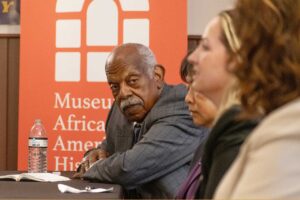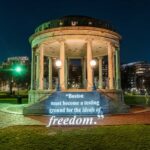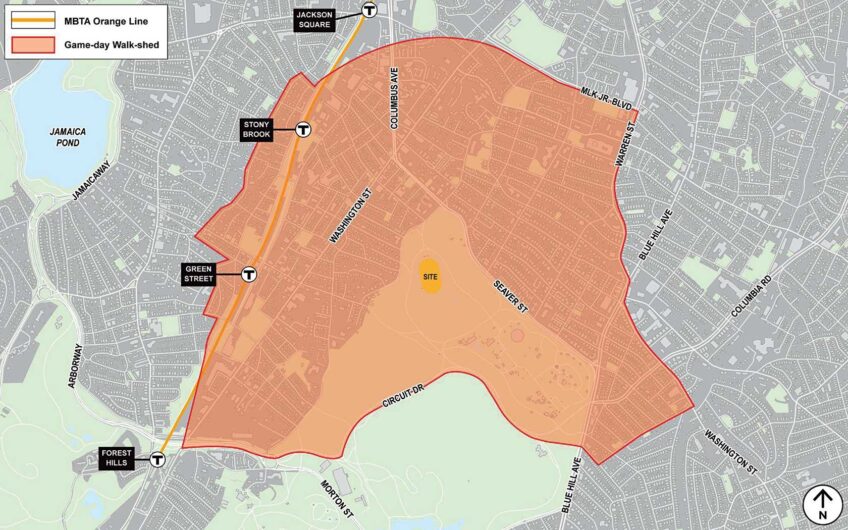
Rep. Ayanna Pressley is pushing for an investigation into the impacts of a recent executive order targeting the operations of federal historical and cultural institutions.
At a roundtable and press conference held at the Museum of African American History on Beacon Hill, May 9, Pressley highlighted a letter she and 70 colleagues sent the week before to the Smithsonian inspector general, an independent watchdog official, to produce a report regarding the effects of the order on the museums as well as the order’s compliance with statutory requirements established by Congress.
She cast the action as a way to push back on what she described as attempts by the administration to portray opinions as facts.
“Donald Trump and anyone else are entitled to their own opinions, but they’re not entitled to their own facts,” Pressley said. “It is important that we have an accurate telling of history.”
The executive order, which Trump signed at the end of March, directs the Smithsonian and the National Park Service to remove “divisive narratives” and “ideological indoctrination” from its museums and sites. Those narratives and ideologies, as described in the order, center around race and diversity, as well as things like the transgender community.
The removals, it suggests, are intended to make the historical institutions in the country “focus on the greatness of the achievements and progress of the American people or, with respect to natural features, the beauty, abundance, and grandeur of the American landscape.”
Pressley described the order as part of a broader effort from the administration to attack diversity efforts and whitewash history.
“Empirical facts are not ideology,” Pressley said at the roundtable. “And so, assertions that the administration would like to stop indoctrination — and in fact, went on to say that we cannot raise children in a country where they grow up to hate themselves — what an incredible irony that then you would work to actively whitewash, censor and rewrite history.”
While the impact of the executive order is specifically targeted at the Smithsonian and National Park Service, Pressley and other speakers at the event said they were concerned about a chilling effect on other museums and institutions across the country.
That order comes from a presidential administration that has taken several steps to reduce the exposure of the history of marginalized groups.
For example, earlier this year, a National Park Service removed images of Harriet Tubman from a webpage about the Underground Railroad and instead emphasized so-called “Black/White cooperation.”
Separately, a page about the military history of baseball legend Jackie Robinson was removed from the Department of Defense’s website.
Both pages were later restored, following pushback.
And as the administration has taken steps to pull back grants and other federal funding, those efforts have included funds that had been targeted at cultural institutions.
The Museum of African American History, which had been awarded a $500,000 grant from the federal Institute of Museum and Library Services to expand capacity in support of student teaching and field trips, was informed April 10 that the federal government was terminating the funding.
In the email informing the museum of the loss of funds, the agency reportedly said that the decision was because the museum “no longer [serves] the interests of the United States.”
Noelle Trent, the museum’s president and CEO, said that it’s a claim with which she “respectfully disagrees.”
“We are not a footnote to American history. We are not an addendum,” she said at the roundtable. “We are ingrained in the narrative, and you do not have a full picture of this country’s story without us.”
The push against museums is one that speakers at Pressley’s roundtable said they think should be opposed.
In digs against the Trump administration, which they called “tyrannical” and the leadership of a dictator, they said they view the attacks on museums as a way to reframe American culture from a Christian-focused and white-focused perspective.

Barry Gaither, director and curator of the Museum of the National Center of Afro-American Artists, listens during the May 9 roundtable event. “There is no American story without us, and that is all of us,” he said at the event. PHOTO: AVERY BLEICHFELD
“We have to really be vigilant to say that we are total people, that we’re not just ‘some folk,’ and that we’re not an ideology,” said Edmund Barry Gaither, director and curator of the Museum of the National Center of Afro-American Artists. “The truth is always complex, big, and internally contradictory. When people turn up with simple answers that basically amount to cutting this back and cutting that off, we know, on the face of it, that’s untrue and we should resist.”
Pressley said a complete and complex historical record is important if citizens feel that the government does not reflect them and their beliefs.
“It has shown us how to resist tyranny. It has shown us how to combat terrorism. It has shown us how to overcome oppression,” Pressley said.
Despite the challenges presented by the federal landscape, panelists said that, in Massachusetts generally and in Boston, support continues to be strong.
Mayor Michele Wu touted the Boston Family Days program as a way to ensure that the city’s young people have access to cultural and historical resources.
That program lets all pre-K to 12th-grade students in Boston visit a host of cultural institutions — including the Museum of African American History, the Franklin Park Zoo, and the Museum of Fine Arts — for free on the first and second Sunday of every month.
“Everyone has, in some ways, a birthright to the history, the wonder, the ideas, the experience of seeing something new,” Wu said at the roundtable. “Being exposed to different cultures, different ideas and the beauty and the marvel that can only come from putting yourself in new and sometimes challenging situations — that is what arts and culture are for, in part.”
Bethann Steiner, director of public affairs at the Massachusetts Cultural Council, pointed to ongoing budget discussions at the State House which currently set the MCC up to be funded at similar levels to last year, even as the state finds itself in what Sen. Michael Rodrigues, chair of the Senate Ways and Means Committee, called, in his message releasing the committee’s budget recommendation, an “all-hands on deck” situation, considering the impact of reduced federal funding.
“At least we can take a small sigh of relief and say we don’t have to divide the conflict,” Steiner said. “We don’t have to storm the State House and make this campaign while we work on organizing around DC and do the same thing,” she said.
Trent, too, highlighted the importance of local support.
She said that many of her colleagues across the country are facing similar challenges but feel unable to speak up. Due to support from state and local officials in Massachusetts, as well as federal elected officials like Pressley, she said that she felt more able to make her voice heard.
“We’re incredibly blessed and privileged to have that level of support, because we know we can step out a little bit further and make some statements, because our community values us,” Trent said. “That’s not the case for everybody.”







Leave a Reply
You must be logged in to post a comment.